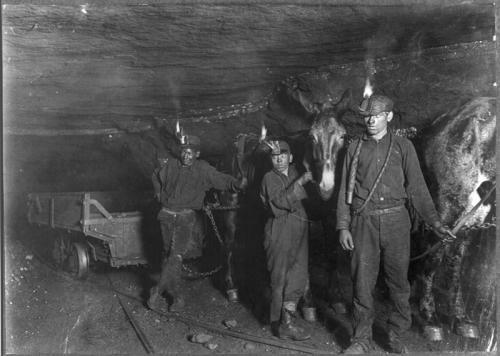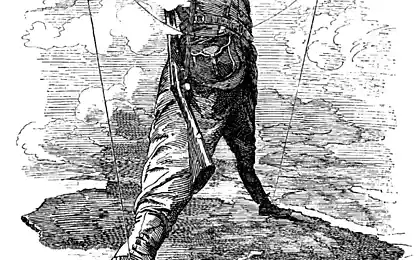772
In capitalist countries, the miners also wrote songs
Songs dedicated to people of working professions, in the Soviet Union as the country of the victorious proletariat, a lot has been written. I myself am a native of Donbass, so the hard work of the miners knew firsthand. However, the danger of the profession fully offset by relatively high wages for those days.
Soviet miners were working pretty privileged caste, so songs praising their work, were clearly optimistic. Whether lyrical "Out in the Donetsk steppe ..." or in Kipling's heroic "Black gold" Vladimir Vysotsky.

In capitalist countries, the miners also wrote songs, but nothing particularly joyful they were not. We talk a lot about the inhuman machinations of Stalin, but somehow forget how charming working common people lived in the United States the same year 1930-40 th.
The concept of "freedom" in general rather ambiguous thing. Can we call a free man, whose life is connected with bonded place of work? And it was because things were with the American miners. Let's start with the fact that cash for their labor, they have not received, and "care" about their way of life completely took over the mining company. It provides working accommodation and obliges them to buy only products in their own stores - of course, all this is then calculated from the salary. As you might guess, the prices in these stores (which workers nicknamed «pluck-me» - «Lie to Me") were too high, and work consistently to get into debt, becoming a natural coal, "serf».
All these realities, spiced with anger and aggression, fully reflected in the most popular American miner song called «Sixteen Tons» («16 tons"). 16 tons of coal - is the norm, which theoretically should have been issued to the surface daily. In practice, it was extremely difficult to implement because, in addition to the actual production work was required to clean their workplace - in particular from filling his water. It is clear, for no pay extra cleaning.
The authorship of the song «Sixteen Tons» still is in question, although both candidates were are familiar with the miners' labor. At the official challenger - folk singer Merle Travis (Merle Travis) - his father worked all his life in the coal mines Myuhlenberg County. It is ironic phrase his father - "I can not afford to die - I owe my soul store Company" - later transformed into the line of the famous song. At the same chorus Merla inspired a letter from his brother John, who wrote bitterly about the death of the Second World journalist Ernie Pyle: "It seems to work in the coal mines. You dig out 16 tons, and what happens? Become a day older and deeper in debt linked ».
Sixteen tons
It is said that out of the dust Created by the people,
A poor man - flesh and blood, there
Muscle and blood, skin and bones,
Intellectually weak, but hardy hump.
Chorus:
Give sixteen tons - and some from the proc?
Himself over for the day and more and more it is your duty.
Do not call, Saint Peter, I come -
I laid the soul to survive in hell.
Overcast in the morning once born
He picked up a shovel and mine run
Coal ninth grade gave sixteen tons
A boss nodded: Well, thank on
Dank morning in the rain, I was born here
Narva-on-trouble - so I'm
I brought an old lioness
Cope with me, not the girl was found.
You see, I'm going? - It is better to stand aside
Who I did not - lost his life
Fist of iron, the other of steel -
If you is not got it right, so left would get
Soviet miners were working pretty privileged caste, so songs praising their work, were clearly optimistic. Whether lyrical "Out in the Donetsk steppe ..." or in Kipling's heroic "Black gold" Vladimir Vysotsky.

In capitalist countries, the miners also wrote songs, but nothing particularly joyful they were not. We talk a lot about the inhuman machinations of Stalin, but somehow forget how charming working common people lived in the United States the same year 1930-40 th.
The concept of "freedom" in general rather ambiguous thing. Can we call a free man, whose life is connected with bonded place of work? And it was because things were with the American miners. Let's start with the fact that cash for their labor, they have not received, and "care" about their way of life completely took over the mining company. It provides working accommodation and obliges them to buy only products in their own stores - of course, all this is then calculated from the salary. As you might guess, the prices in these stores (which workers nicknamed «pluck-me» - «Lie to Me") were too high, and work consistently to get into debt, becoming a natural coal, "serf».
All these realities, spiced with anger and aggression, fully reflected in the most popular American miner song called «Sixteen Tons» («16 tons"). 16 tons of coal - is the norm, which theoretically should have been issued to the surface daily. In practice, it was extremely difficult to implement because, in addition to the actual production work was required to clean their workplace - in particular from filling his water. It is clear, for no pay extra cleaning.
The authorship of the song «Sixteen Tons» still is in question, although both candidates were are familiar with the miners' labor. At the official challenger - folk singer Merle Travis (Merle Travis) - his father worked all his life in the coal mines Myuhlenberg County. It is ironic phrase his father - "I can not afford to die - I owe my soul store Company" - later transformed into the line of the famous song. At the same chorus Merla inspired a letter from his brother John, who wrote bitterly about the death of the Second World journalist Ernie Pyle: "It seems to work in the coal mines. You dig out 16 tons, and what happens? Become a day older and deeper in debt linked ».
Sixteen tons
It is said that out of the dust Created by the people,
A poor man - flesh and blood, there
Muscle and blood, skin and bones,
Intellectually weak, but hardy hump.
Chorus:
Give sixteen tons - and some from the proc?
Himself over for the day and more and more it is your duty.
Do not call, Saint Peter, I come -
I laid the soul to survive in hell.
Overcast in the morning once born
He picked up a shovel and mine run
Coal ninth grade gave sixteen tons
A boss nodded: Well, thank on
Dank morning in the rain, I was born here
Narva-on-trouble - so I'm
I brought an old lioness
Cope with me, not the girl was found.
You see, I'm going? - It is better to stand aside
Who I did not - lost his life
Fist of iron, the other of steel -
If you is not got it right, so left would get























